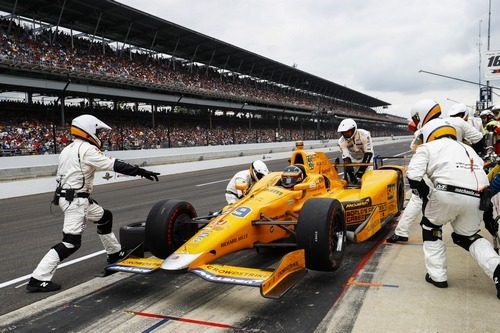
Fans that tuned in to watch Fernando Alonso take on the Indianapolis 500 for the first time in his career witnessed the familiar sight of Alonso climbing out of a smoking Honda-powered car, albeit in an unfamiliar car. But is this latest failure for the Spaniard a tipping point for himself, McLaren and Honda?
Before I go on my rant, I’d like to congratulate Alonso on his simply spectacular performance in the race and I firmly believe that a race victory was not only possible, but deserved. I’d also like to congratulate Takumo Sato, also a familiar face to those who followed Formula One roughly a decade ago, on winning the 101st Indianapolis 500.

With that out of the way, it’s time to discuss Honda’s complete failure at this year’s Indy 500. Not only did they let down Alonso and all of his fans who were watching and supporting him, but they also cost Ryan Hunter-Reay a chance to take the victory. These two incidents are not isolated, with an additional seven Honda engine failures in the lead up to the big race, including some at the Indianapolis Grand Prix and the practice for the Indianapolis 500. The manufacturer also lost a large number of engines in Long Beach and Phoenix.
To me, this shows that Honda’s reliability issues go far deeper than just Formula One and they are severely hurting everyone affiliated with them.

Honda destroyed Alonso’s chance at winning the Indianapolis 500 as a rookie and they also ruined McLaren’s attempt to please their sponsors, who are understandable unhappy with the dismal results in Formula One. Sponsorship placement on the car raced at the Indy 500 was given to McLaren’s sponsors for free as a sort of apology to the companies that are spending money on the F1 project, but getting no positive results.
I think that the engine failure at the Indy 500 will be the tipping point at McLaren. McLaren are going to ditch Honda to go to a better supplier that can actually give them a power unit capable of reaching finish line, rather than just cruising around no faster than a kart only to burst into a cloud of smoke less than half way through a Grand Prix.

Honda’s Formula One performance has been shameful and has seriously hurt their brand reputation. It’s hurting McLaren’s reputation too. The lack of sponsorship logos on the car, the angry sponsors and the complete restructuring of management are all signs that McLaren is in trouble and it would be 100% justifiable if McLaren were to arrange a deal with Mercedes, Ferrari or even Renault for 2018 onward.
Although the Indy 500 was likely a nice relaxing break from Formula One, the Honda issues are hurting Alonso too and putting his future in serious doubt. He is at the age now where he could be exiting Formula One as soon as next season. With a double retirement in Monaco for McLaren and multiple engine failures in IndyCar for Honda, does Alonso really have the confidence that Honda will improve in the near future or would he rather snatch up a racing seat somewhere more competitive or even just retire altogether? After all, if Honda still has serious issues after over a decade in IndyCar, how long is it going to take before they correct their issues in Formula One?
On a positive note, Alonso and the McLaren sponsors still got plenty of exposure at this year’s Indianapolis 500 and were probably the most talked about topic of the event. But that is all because it’s Alonso; it has nothing to do with McLaren or Honda.
The views and opinions expressed in this article are solely those of the author and do not necessarily reflect the official policy or position of any other agency, organization, employer or company. Assumptions made in any analysis contained within this article are not reflective of the position of any entity other than the author.